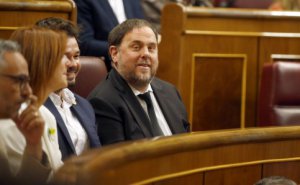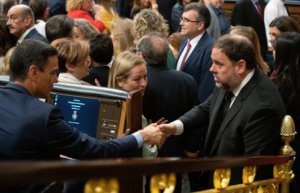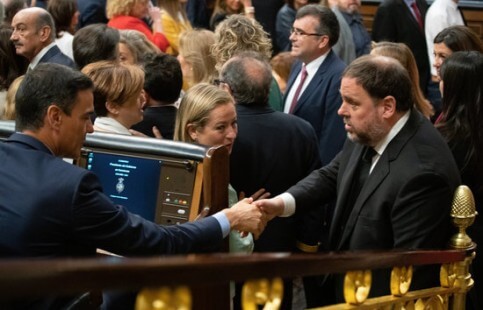Jailed former Catalan vice-president Oriol Junqueras, on temporary release for the opening of Spain’s Congress, took the opportunity to engage with acting Spanish Prime Minister Pedro Sánchez.
Junqueras, elected an MP for pro-independence Esquerra Republicana (ERC) in the 28 April General Election – along with four of his fellow defendants in the on-going Catalan Trial at the Supreme Court over alleged rebellion – were granted permission to swear in at the Madrid parliament, although they may subsequently be suspended.
ALSO READ: Cs leader Albert Rivera tweets ‘cold stare’ image of himself
On the sidelines of a preliminary vote for the congress speaker, Junqueras approached Sánchez, congratulated him on his Socialist Party’s (PSOE) victory in the general election, and wished him ‘all the best’ for his anticipated term in power, according to sources in the chamber.

Later in the session, as Junqueras approached Catalan Socialist Meritxell Batet after her election to the chair, he again stopped before the prime minister’s seat and both agreed on the need to ‘speak’.
The brief encounter was the first of any kind between the politicians since Sánchez took up office last June following a vote of no confidence in the previous government, and Junqueras’ first audience with a Spanish prime minister since the failed independence drive in October 2017.

Junqueras also had a brief conversation with former Spanish foreign minister Josep Borrell, one of his 47 Catalan colleagues in Congress, and a number of other outgoing cabinet members.
The four imprisoned MPs, including the Junts per Catalunya (JxCat) party’s Jordi Sànchez, Jordi Turull and Josep Rull, were greeted with a sprinkling of applause and a couple of cries of ‘out, out’ as they entered the chamber ahead of the inaugural session of the newly-elected Spanish parliament.
The imprisoned independence leaders, with former Catalan foreign minister Raül Romeva taking his seat in the Senate, were allowed to move freely but plain-clothed police officers awaited them at the chamber doors in order to accompany them directly back to prison after the sessions.
What happens next to form the new Spanish Government?
Ten months after overthrowing the right-wing People’s Party (PP) government via a vote of no confidence, Pedro Sánchez‘s Socialist Party (PSOE) won the most seats in Congress for the first time since 2008, shoring up its status as the ruling party and that of Sánchez as prime minister.
However, Sánchez found himself well short of an overall majority and still needs to secure the support of at least left-wing Unidas Podemos – as well as parties from the Basque Country and the Canary Islands – in order to win enough votes for Congress to allow him to keep power.
Pro-independence Esquerra Republicana (ERC) resoundingly came top in Catalonia with imprisoned candidates at the centre of its campaign – its first victory at any election in nearly a century.
The PP suffered the worst result in its history, losing more than half of its seats, but managed to hold onto its status as the main opposition party ahead of staunch unionist Ciudadanos (Cs).
Meanwhile, Vox became the first explicitly far-right party to gain major representation in the Congress, although it will likely have limited influence with less than a tenth of the seats.


